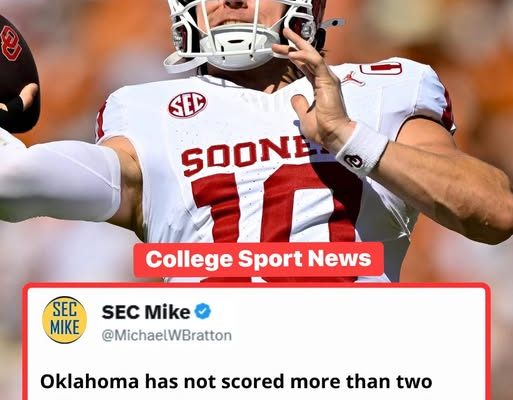Oklahoma joined the SEC and suddenly forgot how to put points on the board. For a program built on explosive offense, Heisman winners, and breathtaking Saturday shootouts, that statement almost feels sacrilegious. Yet, here we are — watching one of college football’s most storied scoring machines sputter and stall in ways few could have imagined. The Sooners, who once seemed to produce 40-point outings as effortlessly as they produced NFL quarterbacks, have entered a new era where offense isn’t automatic, defenses hit harder, and the margin for error has all but disappeared.
When Oklahoma announced its move to the Southeastern Conference, the anticipation was electric. The Sooners, long dominant in the Big 12, were ready to step onto a bigger stage — to prove that their brand of football could stand tall against the giants of the South. But the SEC, as they’re learning, is a different kind of animal. The speed is different, the defenses are deeper, and the physicality on both lines of scrimmage can turn the most creative offenses into grinding battles for every yard. For the first time in years, Oklahoma’s opponents aren’t gasping to keep up. Instead, it’s Oklahoma who’s struggling to find its rhythm.
This isn’t the first time a team famed for its high-powered offense has met resistance in the SEC. Fans remember how Texas A&M’s early fireworks faded after their own transition. But with Oklahoma, the contrast feels especially stark. This is the same program that produced Baker Mayfield, Kyler Murray, Jalen Hurts, and Caleb Williams — quarterbacks who defined the modern college game with their improvisation, precision, and fearless playmaking. For nearly a decade, Oklahoma’s offense wasn’t just good; it was revolutionary. Lincoln Riley’s schemes turned college football into a highlight reel, with deep shots, misdirection, and pace that left defenses dizzy. But those days, at least for now, feel like a lifetime ago.
The SEC’s defensive blueprint is the primary culprit. It’s not that Oklahoma suddenly forgot how to call plays; it’s that every yard now feels like a negotiation. SEC defenses are built from the inside out, with NFL-caliber linemen who dominate the trenches and linebackers who can run sideline to sideline. The Sooners’ offensive line, long used to dictating tempo and creating space, now finds itself overpowered and outmuscled. In the Big 12, finesse and speed were often enough. In the SEC, brute strength and discipline rule the day.
And the result is glaring. Drives that once ended in touchdowns now fizzle in midfield frustration. Quarterbacks who once looked invincible now look hurried, hit, and hesitant. The Sooners’ timing — the rhythm that made their air raid attack so lethal — is off by just enough to make everything look uncomfortable. The difference between 2nd-and-4 and 3rd-and-9 is massive, and Oklahoma is discovering just how unforgiving SEC defenses can be in those moments.
But beyond the X’s and O’s, there’s a psychological adjustment at play. Oklahoma’s players and coaches have spent decades as the hunters, the ones every other team in the Big 12 measured itself against. They dominated recruiting within their footprint, dictated tempo, and carried themselves with a swagger born of consistent success. Now, they’ve entered a league where that swagger must be earned anew every Saturday. No one in the SEC fears the “OU” on the helmet yet. Respect, in this conference, comes only after seasons of survival.
Head coach Brent Venables, a defensive mind by trade, understands this as well as anyone. His challenge isn’t just about scheming around better defenses; it’s about reprogramming a team’s entire DNA. Oklahoma must evolve from being an offensive-first, finesse-driven powerhouse into a balanced, physical, battle-tested team that can win ugly. Venables knows what works in the SEC — he saw it firsthand during his years at Clemson, when his defenses helped take down SEC powerhouses on the national stage. But translating that vision to Norman is proving to be a test of patience and resilience.
The irony of Oklahoma’s struggles isn’t lost on its fans. For years, the biggest complaint about the Sooners wasn’t their ability to score; it was their inability to stop anyone else. Now, the script has flipped. The defense, once a liability, is the unit keeping games competitive. The offense, meanwhile, has become the problem child. That’s a sentence that would’ve seemed unthinkable not long ago.
And yet, this growing pain might be necessary. Transitioning to the SEC was never going to be seamless. It’s one thing to dominate Kansas or Texas Tech; it’s another to move the ball on Alabama, Georgia, or LSU. The Sooners’ offensive staff is learning that schematic creativity must now be paired with physicality. Fancy motion and misdirection won’t mean much if your offensive line can’t win first contact. Oklahoma is also finding that quarterback play in the SEC demands a different kind of poise. These defenses disguise coverages with sophistication, send pressure from unpredictable angles, and punish mistakes mercilessly. There’s less time, less space, and less margin for experimentation.
For the players, this is a reality check — but also a chance to redefine what Oklahoma football stands for in this new era. The program can no longer rely on outscoring everyone. It must now embrace the grind of the SEC, where games are decided in the trenches, and points are earned through attrition. That means recruiting differently, developing linemen with SEC size and power, and building depth at every position. The Sooners are in the early stages of that transformation, and while it’s painful in the short term, it’s a process that could pay off down the line.
Fans, of course, are restless. They remember the fireworks, the record-breaking box scores, and the glory days of Lincoln Riley’s machine. But college football evolves, and the SEC doesn’t forgive nostalgia. Venables and his staff are betting that the long-term vision — one built on toughness and balance — will eventually restore Oklahoma to prominence, even if it means enduring short-term offensive frustration. Patience, though, is in short supply when your team used to score 50 points a game and now struggles to reach 20.
Still, there are signs of hope hidden beneath the frustration. The defense’s growth is real and sustainable. The roster is filled with young talent that’s learning fast. The mistakes on offense, while glaring, are correctable. Execution, timing, and confidence — all things that can return with experience — have just momentarily faded. Every great program that transitions to a tougher league goes through a similar phase. The Sooners are learning what every SEC team already knows: talent is only half the battle; the other half is consistency, toughness, and the ability to win when things aren’t going your way.
What makes this story compelling is that Oklahoma’s offensive slump isn’t the end of something — it’s the beginning of something else. It’s a humbling reminder that even elite programs must adapt or be left behind. For the Sooners, the SEC is forcing them to grow in ways they never had to before. The competition is sharper, the spotlight brighter, the pressure heavier. But this crucible can forge something greater — a version of Oklahoma that isn’t just flashy, but formidable.
Football, at its core, rewards resilience. The Sooners are being tested in ways that statistics can’t fully capture. Their playbook is being rewritten, their identity redefined, their confidence rebuilt. It may look ugly now, but this is how programs evolve. The difference between an SEC newcomer and an SEC contender is forged through weeks like these — when everything feels hard, and nothing comes easy.
In time, Oklahoma’s offense will find its rhythm again. It always does. The program’s history is too rich, its talent pool too deep, its tradition too ingrained to stay quiet for long. But the lessons learned now — about toughness, patience, and humility — might just be the foundation for something even greater. For years, Oklahoma’s greatness was defined by points. Perhaps, in this new era, it will be defined by persistence.
Right now, it’s easy to joke that Oklahoma joined the SEC and forgot how to score. But one day, when the Sooners are battling toe-to-toe with the league’s elite and putting points back on the board, fans will look back on this period as the storm before the calm — the necessary struggle before the return of the roar. And when that happens, the rest of the SEC will remember that Oklahoma never truly forgot how to score. They were just learning how to win differently.



